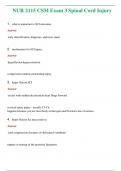Exam (elaborations)
NUR 2115 ( LATEST 2024 / 2025 ) CSM EXAM 3 SPINAL CORD INJURY | PASSED | A+ RATED GUIDE | NEW FULL EXAM
- Course
- Institution
NUR 2115 ( LATEST 2024 / 2025 ) CSM EXAM 3 SPINAL CORD INJURY | PASSED | A+ RATED GUIDE | NEW FULL EXAM
[Show more]



